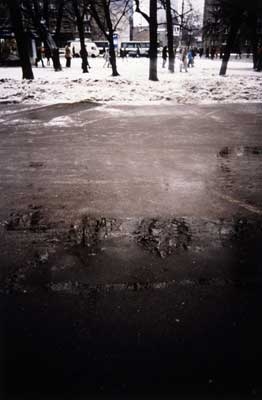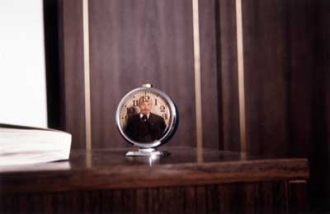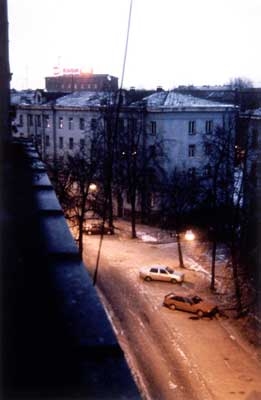About The Exhibition
In 2001 David Bate made a series of photographs in and around the medieval city of Tallinn in Estonia, situated on the former Soviet Union's East/West border. Following the fall of the Berlin Wall, Estonia gained independence in 1991 and began the transition from communism to market economy, a transformation of social and political, as well as economic structures. This transition has been fraught with problems; the collapse of the middle classes, the growth of mafia capitalism and the fragility of a democracy with meaningful freedoms which has seen the rigorous control of independent media. Tallinn, now open to tourism, trade and foreign capital investment, is a city, with a troubled past, standing at the threshold of a future promising the uncertainties of progress.
David Bate's photographic series Zone draws influence from Russian director Andrei Tarkovsky's film Stalker (1979) also shot in Tallinn. The film tells a story of 2 men being led by 'the stalker', a guide, through a contaminated wasteland or zone controlled by an alien intelligence. It is believed that within the 'zone' exists a room in which the desires, conscious or unconscious, of all who enter are granted. When the men reach the threshold of the zone, they grow fearful of what the fulfilment of their desires might mean, they decide not to enter and return home.
Bate reads the 'zone' as a metaphor for Western consumer culture, he observes its effects on the city and citizens of Tallinn, how it reshapes space and how 'desire must be negotiated across alien rules'. The work is subtle; it operates both as a metaphorical description and as personal memories of an unfamiliar place. In a review of the work, Katrin Kivimaa suggests that despite homogenising global processes; 'there still remains an unbridgeable gap between the people for whom the clock with Lenin's image on it is a souvenir and those for whom it was a reality'.
Belfast Exposed showed th Zone as part of an ongoing series of exhibitions presenting contemporary art-documentary representations of public space in cities currently undergoing rapid development and dramatic change.
This exhibition is supported by Focal Point Gallery, Southend-on-Sea.








